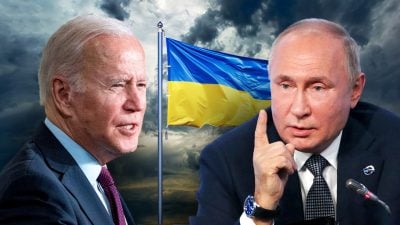Video: Russia Aims to Cripple Ukraine’s Military as Putin Launches Major Offensive. Jacques Baud

All Global Research articles can be read in 51 languages by activating the Translate Website button below the author’s name (only available in desktop version).
To receive Global Research’s Daily Newsletter (selected articles), click here.
Click the share button above to email/forward this article to your friends and colleagues. Follow us on Instagram and Twitter and subscribe to our Telegram Channel. Feel free to repost and share widely Global Research articles.
Give Truth a Chance. Secure Your Access to Unchained News, Donate to Global Research.
***
First published by GR on June 6, 2024
Jacques Baud is a former member of Swiss strategic intelligence, a specialist in Eastern European countries and head of United Nations peace operations doctrine.
He was engaged in negotiations with top Russian military and intelligence officials right after the fall of the USSR.
Within NATO, he participated in programs in Ukraine and in particular during the Maidan revolution in 2014.
Watch his interview below with Nima R. Alkhorshid of Dialogue Works:
Below is an excerpt from his article, The Military Situation In The Ukraine, first published on Global Research in March 2022:
As a former head of analysis of Warsaw Pact forces in the Swiss strategic intelligence service, I observe with sadness—but not astonishment—that our services are no longer able to understand the military situation in Ukraine. The self-proclaimed “experts” who parade on our TV screens tirelessly relay the same information modulated by the claim that Russia—and Vladimir Putin—is irrational. Let’s take a step back.
…
On 17 February, President Joe Biden announced that Russia would attack Ukraine in the next few days. How did he know this? It is a mystery. But since the 16th, the artillery shelling of the population of Donbass had increased dramatically, as the daily reports of the OSCE observers show. Naturally, neither the media, nor the European Union, nor NATO, nor any Western government reacted or intervened. It would be said later that this was Russian disinformation. In fact, it seems that the European Union and some countries have deliberately kept silent about the massacre of the Donbass population, knowing that this would provoke a Russian intervention.
…
In fact, as early as February 16, Joe Biden knew that the Ukrainians had begun intense shelling the civilian population of Donbass, forcing Vladimir Putin to make a difficult choice: to help Donbass militarily and create an international problem, or to stand by and watch the Russian-speaking people of Donbass being crushed.
If he decided to intervene, Putin could invoke the international obligation of “Responsibility To Protect” (R2P). But he knew that whatever its nature or scale, the intervention would trigger a storm of sanctions. Therefore, whether Russian intervention were limited to the Donbass or went further to put pressure on the West over the status of the Ukraine, the price to pay would be the same. This is what he explained in his speech on February 21. On that day, he agreed to the request of the Duma and recognized the independence of the two Donbass Republics and, at the same time, he signed friendship and assistance treaties with them.
The Ukrainian artillery bombardment of the Donbass population continued, and, on 23 February, the two Republics asked for military assistance from Russia. On 24 February, Vladimir Putin invoked Article 51 of the United Nations Charter, which provides for mutual military assistance in the framework of a defensive alliance.
In order to make the Russian intervention seem totally illegal in the eyes of the public, Western powers deliberately hid the fact that the war actually started on February 16. The Ukrainian army was preparing to attack the Donbass as early as 2021, as some Russian and European intelligence services were well aware.
In his speech of February 24, Vladimir Putin stated the two objectives of his operation: “demilitarize” and “denazify” the Ukraine. So, it was not a question of taking over Ukraine, nor even, presumably, of occupying it; and certainly not of destroying it.
From then on, our knowledge of the course of the operation is limited: the Russians have excellent security for their operations (OPSEC) and the details of their planning are not known. But fairly quickly, the course of the operation allows us to understand how the strategic objectives were translated on the operational level.
—Jacques Baud, The Military Situation In The Ukraine, 1 March 2022
Consult Jacques Baud’s other articles on the subject:
Kharkov and Mobilization: “Tactical Victory for Ukraine, Strategic Victory for Russia”. Jacques Baud
By , October 17, 2022
US, EU Sacrificing Ukraine to ‘Weaken Russia’: Former NATO Adviser Jacques Baud
By , April 18, 2022
*
Note to readers: Please click the share button above. Follow us on Instagram and Twitter and subscribe to our Telegram Channel. Feel free to repost and share widely Global Research articles.

